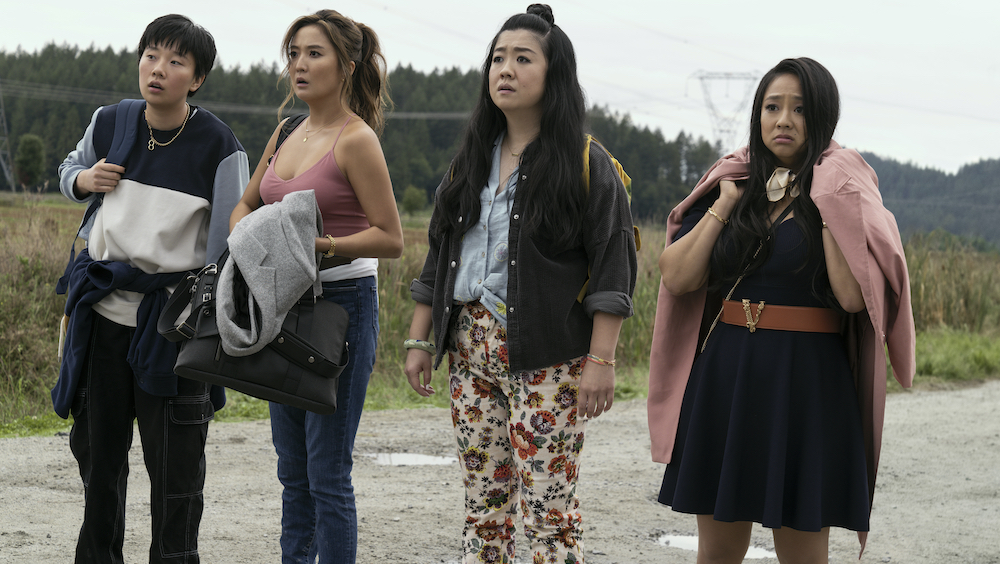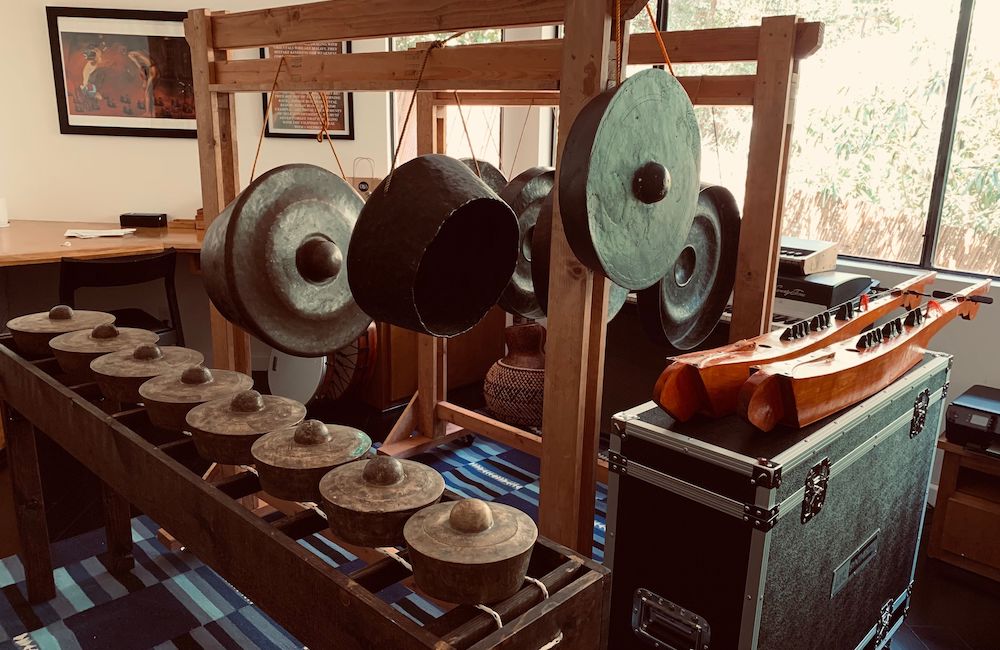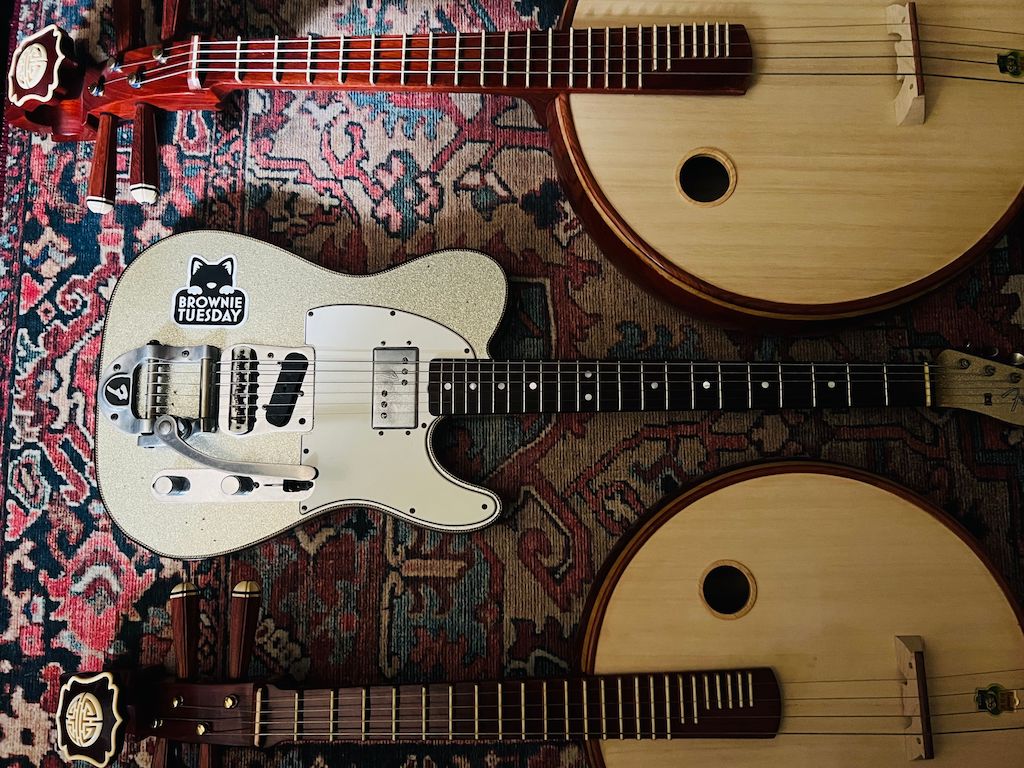
Joy Ride is a party of a movie. Director Adele Lim‘s comedy has the highs and lows of too much of a good time or, in this case, a friendship. The ensemble film is a nuanced portrayal of the sometimes complicated love between old friends. There’s far more beneath the surface to unpack in Joy Ride, but on the surface, it’s a Costco-sized barrel of laughs.
The original comedy sees a group of friends – played by Sabrina Wu, Ashley Park, Sherry Cola, and Stephanie Hsu – travel to China and experience all sorts of hijinks, questions about identity, and epiphanies.
Composer Nathan Matthew David helps the filmmakers, including writers and producers Cherry Chevapravatdumrong and Teresa Hsiao, navigate the wild ride of a tone with delicacy. David is the Peabody Award-winning and Emmy-nominated composer behind Deadly Class, Angie Tribeca, and Surviving R, Kelly. Most recently, he scored Chang Can Dunk and Stephen Curry: Underrated.
Given the variety of the composer’s work, it’s no surprise he knew how to find the right tone for the cries and tears in Joy Ride. Recently, David took us behind-the-scenes of Joy Ride and talked to us about going from an assistant a composer.
Below-the-Line: What was your initial reaction and kind of your initial musical instincts for what the movie needed?
Nathan Matthew David: I started very early. Thankfully, they brought me on before they shot. Speaking with the filmmakers like Cherry, Teresa, Adele, and the music supervisor Toko [Nagata], we all had an idea of potentially what we wanted to pursue. With it sounding modern, there were going to be a lot of songs in the film, so the score had to live side by side with the songs. But aesthetically, we knew there was going to be an acoustic organic sort of feel to it.
The question at that time was, how do we comment on the Asian American experience? Is there a path to making our score unique in that way? And so, that is something that we came to, so I think going into it, before having seen anything, I knew roughly where we wanted to be. Eventually, once I saw it, the vision was strong enough that it made what we initially talked about make sense. And then it was like how to actualize.
BTL: That’s rare to be brought in that early, right?
David: I love being brought on that early. I would say it rarely happens. But I love it when it does. With Joy Ride, I was able to write music early on before the edit. I did suites, and a lot of those suites are in the final film now. Adele and the team were able to use those ideas and cut them in wherever they wanted.
BTL: Did you originally write any cues for more comedic scenes or jokes? How did that play?
David: I generally don’t [laughs]. I was grateful because I once assisted Teddy Shapiro and Wig Goranson, and they have a lot of comedic backgrounds. I was able to be in that world. When I got out of USC, I was working on Community, which was terrifying because I feel like as composers we generally like to do the Oscar films or, you know, give us a sweeping beautiful score to where we can just write beautiful melodies. And so, it was really wonderful to be thrown into the fire and write for comedy pretty early on. To this day, finding the comedic tone is always the trickiest thing, even on an editorial level.
And so, writing suites, I was like, “Let’s go to the emotion first.” I love that. There was an aspect to the film, as you saw, that had sort of like a drug aspect to it and them being out of their minds. I went to that space, and a more experimental place as well. Those were the first areas I touched. And then once we got the film, I was able to work with the comedic moments and the rhythm of it.
BTL: For the drug trip, how did you want to get experimental?
David: For the train sequence or the aftermath of the train sequence, I was able to just go full speed, you know, in a modular sense, like electroacoustic sounds and some sound effect stuff. One of the cues has a layer of me going out and recording birds. The filmmakers were down to try some interesting things that bordered on sound design.

BTL: Joy Ride is an unconventional comedy, in that there are beautiful landscapes and settings, so it’s a big canvas. Usually, comedies don’t look this good. Did the unique scope and tone provide more musical opportunities?
David: Yeah, absolutely. Thankfully, we were able to establish a theme early on when Audrey and Lolo met each other for the first time. It’s the same theme that we hear when they go through their breakup and then when they reconnect. I think a lot of that comes down to the heart of the film and Adele’s aesthetic, as well as the filmmakers’ aesthetics, that informed and gave us permission to really lean into the emotion and be more melodic than other comedies would.
BTL: Coming out of USC, what were your career expectations, and how does the reality of being a composer compare?
David: It’s evolved a lot. When I was at USC, the initial idea was just to survive. I assisted for six or seven years out of USC. My mentors were incredible and gave me a wonderful foundation. I’ve been on my own since about 2019, and now, the community has changed, filmmaking has changed, and stories have changed with a film like Joy Ride. So, this really is where I feel so much heart and connection to an Asian American story.
For Joy Ride to be one of the first of its kind and for Adele to be behind the camera, who voiced and expressed herself in amazing ways, it felt really good to support that kind of story. Joy Ride is exactly the kind of story that I’m grateful to tell; stories that uplift culture are exciting to me. There’s a lot to explore in that space, and we’re just getting started, but this is definitely one that I was very grateful to be a part of.
BTL: You asked yourself, how can the score comment on the Asian American experience? So, how do you do that?
David: For this one, the main concept was that we knew it was going to be a modern, let’s say, electronic or more band-sounding score overall. There are a lot of warm or acoustic organic elements, alongside the guitars, keys, synthesizers, and percussion that we’re more used to hearing on records. I also use the guzheng or the ruan but play them in very non-traditional ways outside of traditional rhythms or melodies. I put them alongside the guitars and the synthesizers, and I processed them through pedals.
Hopefully, it feels cohesive, and you don’t know if you’re hearing a guitar or ruan, or if you don’t know if you’re hearing a guzheng or a synthesizer. It’s sort of a commentary on being an Asian American living here in the US, writing music, and trying to find ways to incorporate my culture into my music. How do I do that authentically, as well?

BTL: That’s also really cool, not just as a composer, but as a storyteller, the fact that you were using the past and the present in your score. Thematically, that feels right for Joy Ride.
David: Oh, thank you. It’s something I’ve been thinking about a lot. In my own work, I just discovered indigenous Filipino music six or seven years ago, and I come from a background where I studied a lot of Western classical music and played in bands and had all that experience. Now, it’s a lifelong process for me to dig into these indigenous roots that are through my family. It’s just informing so many things and a joy to discover.
BTL: What, in particular, has inspired you from indigenous Filipino music? How has it changed you as a musician?
David: I think one thing I could say concretely that I’ve tried to lean on is the rhythmic modes in Filipino music. I’ve been very drawn there. Obviously, you can’t force a square into a circular hole, so I’m just allowing it to subtly affect me, where I’ll hear something and be like, “Oh, there is that mode, that rhythmic mode used in my music.” Or in some cases, when I do some of my sound designer textural work, I will take some Filipino instruments and process the hell out of them, so there’s a layer in there. You wouldn’t know it, but there’s a layer in there.
[Spoiler Ahead]
BTL: Any other examples in Joy Ride of, maybe the audience won’t know that’s what they’re hearing, but they’ll feel it as they watch the movie.
David: I would say when Audrey puts on the qipao before she goes to the adoption agency, like that cue, for instance, is a 50-50 blend of guitars or ruan, and you don’t quite know what is which. I wrote parts where they interlock in that way.
[Spoiler Over]

BTL: Since this is an ensemble movie, did you have different themes for each character? For example, Deadeye, any themes for them?
David: For Deadeye, there was one moment for them that was more of an emotional moment when they were trying to board the private plane and they realized their friends had left. Their love of K-Pop informed that cue. I used a layering of harmonized vocals, and then it goes into a brighter moment with a poppier production.
BTL: Did you ever consider writing a theme for [NBA star and Joy Ride co-star] Baron Davis?
David: You know, there were some iterations where I tried something for him. It would’ve been cool to do something for him, but he speaks for himself, and the songs were amazing for him.
BTL: The movie was originally NC-17, and unfortunately, cuts were made. Was any of your work lost?
David: I think the one scene that made it NC-17, my music is definitely not on that.
BTL: And I think that deleted scene is a damn shame.
David: [laughs] I do wonder if there will ever be an NC-17 version released.

BTL: As you said earlier, after school, you just tried to survive. At what point in your career did you feel comfortable? Or is comfort rare in this line of work?
David: I don’t know, like, comfortable? [laughs] I would say that, for whatever it’s worth, I have the dream of having a film that’s in theaters and in a good number of theaters. It’s cool to have that experience. I don’t know, though, because my dad keeps me humble. My dad’s always been very skeptical of a career in the arts. I’ll tell him about what I’m working on, and he’ll be like, “Oh, okay, like, what does that really mean?” And then when it came to Joy Ride, I was like, “It’s gonna be in theaters.” He was like, “Oh, okay.” He’s sort of, you know, taking me a little bit more seriously [laughs]. It’s good to have that balance to put things into perspective.
BTL: What if your dad said, “I heard movie theaters were going extinct”?
David: [laughs] That’s probably gonna be the next conversation.
BTL: You were a part of one of the coolest scores to hear in a theater in recent years, Tenet. You worked with Ludwig on Community as well. What was your experience on the Christopher Nolan film?
David: Ludwig is a genius generational talent. It’s always a joy to take the ride with him. That one was cool synth experimentation. A lot of play, honestly. Ludwig always pushes his ideas and asks a lot of questions, especially about that film and its ideas and concepts. There was a lot of just playing with inversion and that whole world.
For one of the main themes, I recorded 65 different synthesizers and played them like an orchestra. Each note was a different string player, and that was a really cool concept. It was just trying to come up with really interesting sounds. When I work with Ludwig, I gotta try to bring my A-game as much as possible.

BTL: You also brought your A-game to Deadly Class, which was a really fun show. How was experimenting with the sound of the ’80s there?
David: I was more into the post-punk sounds, like some more guitar-driven stuff, the more moody stuff that was super fun to do alongside the more synth-driven stuff. Obviously, at that time when the show was being made, Stranger Things was having a big moment. We definitely wanted to stay away from that kind of sound and find our own moment in time in the eighties.
BTL: Was that a positive experience?
David: Yeah, for sure. Rick [Remender] and Miles [Feldsott] and the Russo Brothers, the way they think about music and talk about music is so freeing. They’re really open to you bringing your sound and your ideas. The places that the show went with the animated sequences and things like that, there was so much to explore. It was one of my first experiences outside of being an assistant. I really just gave an entire year of my life to that show. It was sad to see it go away, but I’m happy that it exists as it does, you know?
BTL: So, you’ve gone through surviving and thriving as a composer, and you’re clearly enjoying this moment with Joy Ride. For aspiring composers, what advice would you give them when they’re struggling as well as when they’re succeeding?
David: Man, as someone who spent many years as an assistant, I think I had to wait for a moment to have this opportunity, to have a film that satisfied a lot of different needs. I would say I focused so much on growth and development. I was grateful to be with the mentors that I had and see them work on their projects, and I really tried to have a beginner’s mind and growth mentality through all of that. I was grateful to absorb everything I was absorbing.
Now, with Joy Ride going to theaters and these projects happening, it’s exciting, but I never felt entitled to have this career. You know, I feel very grateful to have these experiences, to talk to you, and to work with the filmmakers I’ve worked with, but tomorrow’s not guaranteed. And so, I’m just very grateful for where I am right now. If I had to give advice to younger composers, if you can lean into the growth of a moment and what a moment can give you in terms of your own personal growth and also the growth in your career, there can be a lot there.
Joy Ride is now playing in theaters.





